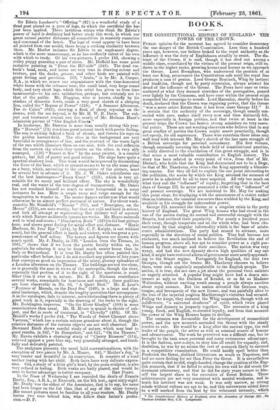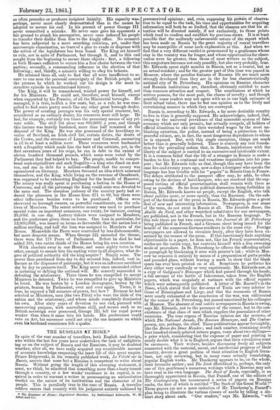BOOKS.
THE CONSTITUTIONAL TITSTORY OF ENGLAND.* THE POWER OF THE CROWN.
Puniac opinion for the moment has agreed to consider democracy the one danger of the British Constitution. Less than a hundred years ago, however, our fathers looked to the royal authority as the influence it was the duty of Englishmen steadily to resist. The dis- trust of the Crown, it is said, though it has died out among a middle class, conciliated by the virtues of the present reign, still en- dures in the higher ranks, growing keener and keener as we approach the throne. Lord Brougham, who understood the position of at least one King, pronounces the Constitution safe until the royal line produces a man of genius. Lord George Bentinck, Whig by instinct and tradition, though not by party connexion, always avowed his dread of the influence of the throne. The Peers have once or twice muttered at what they deemed stretches of the prerogative, passed over lightly by the Commons, and have once within the present reign compelled the sovereign to recede. Lord Macaulay, shortly before his death, declared that the Crown was regaining power, that the throne "was a more active Estate than it had been since George HI." It is certain that the authority of the sovereign, though usually con- cealed with care, makes itself every now and then distinctly felt, more especially in foreign politics, and that twice at least in the present reign the Crown has beaten strong ministers on very essen- tial points. There are not wanting observers who believe that in any great conflict of parties the Crown might assert practically, though not openly, its old supremacy. Those who entertain these ideas may well read with interest Mr. May's sketch of the last open struggle of a British sovereign for personal ascendancy. His first volume, though nominally covering the whole field of constitutional practice, is really directed to the elucidation of this great struggle, and is in that sense a most valuable contribution to English. history. The story has been related in every point of view, from that of Mr. Disraeli, who holds that the King had determined not to be a Doge, to that of Mr. Thackeray, who thinks the King apparently a blunder- ing maniac. But they all fail to explain the one point interesting to the politician, the means by which the King attained the measure of power he is admitted by all to have acquired. All rely too much on what they call the "influence" of royalty, forgetting that in the best days of George III. he never possessed a tithe of the "influence" of our present sovereign. We are indebted to Mr. May for making this point clear, for displayine.6 with the minuteness of a statist rather than an historian, the material resources then wielded by the King, and available in his struggle for independent power.
George III. ascended the throne at a singular crisis in the party history of England. The great Whig n ig houses who had stood the van of the nation during its second and successful struggle with the Stuarts, had outlived their popularity. For nearly a hundred years their sway, though temperate and on the whole wise, had been cha- racterized by that singular infecundity which is the bane of aristo- cratic administrations. The party had ceased to advance, more especially in the direction of social politics. They had become too exclusive, too much inclined to believe time Revolution the end of human progress, above all, too apt to consider power as a right pur- chased by their courage and their sacrifices. The nation was very weary, and had the new dynasty shown high qualities of any one kind, it might have restored a form of government more nearlyapproach ing to the Stuart regime. Fortnnately for England, the first two Georges, though not the brutes Mr. Thackeray chooses to believe them, were men singularly unpalatable to the English people. The nation, it is true, did not care a jot about the personal vices satirists so eagerly attacked. A popular king might have had a dozen mis- tresses as ugly as the Duchess of Kendal, or as fat as Madame Walmoden, without exciting wrath among a people always careless about royal amoura. But the nation detested the German ways, tongue, and brusquerie of the new House, and was.painfully alive to the lossof the imperial poaitiou Marlborough's victories had secured. Failing the kings, they endured the Whig magnates, though with an indifference, "a universal deadness" of spirit, which twice placed Whigs and dynasty in jeopardy together. The accession of a king young, frank, and English, re-created loyalty, and from that moment the power of the Whig Houses began to decline. The occasion was favourable for the development of monarchical power, and the new monarch ascended the throne with the steady resolve to rule. He would be a king after the ancient type, the real leader of the people, the active as well as nominal source of honour and advancement. The work he perceived was a difficult one, but be brought to the task some personal and many extraneous advantages. It is the fashion, now-a-days, to deny him all credit for capacity, and, doubtless, he was by no means the sort of monarch likely to succeed in a competitive examination. He could hardly spell better than Frederick the Great, disliked litterateurs as much as Napoleon, and had no more feeling for art than Peter the Great. It is nevertheless quite certain that be did, single-handed, change the position of the Eng- lish monarch, that if he failed to attain his own end he did crush the dominant aristocracy, and that he did for sixty years secure to him- self the largest share in the executive of Great Britain. Those achievements are not very consistent with mental weakness, and in truth his intellect was not weak. It was only narrow, as strong minds without culture are apt to be, and this narrowness added force to a will marked from the first by the vehement intensity, which
• The Constitutional History of England, since the Accession of George III. 335 Thomas Erskine kitty, C.B. Longman&
so often precedes or produces incipient hisinity. His capacity was, perhaps, never more clearly demonstrated than in the means he adopted to secure his end. In his pursuit of power George III. never committed a mistake. He never once gave his opponents a fair ground to attack his prerogative, never once induced his people to transfer their dislike from him to the kingly office. No monarch has been subjected to a more searching criticism, yet, under that microscopic examination, no trace of a plan to evade or dispense with the action of the legislature has been found. The King set himself to rule, not in spite of Parliament, but through it, and to this end sought from the beginning to secure three objects : first, a following in both House's sufficient to secure him a free choice between the two parties; secondly, a commanding influence in the election of that following; and, thirdly, a ministry willing to obey his behests. He attained them all, only to find that all were insufficient to se- cure to one man the personal sovereignty of the British people, and the process by which he worked out his design is the most in- structive episode in constitutional history.
The King, it will be remembered, wanted power for himself, not for his Ministers. He could not, therefore, avail himself, except when supported by his Premier, of all the Ministerial boroughs. He managed, it is true, to filch a few seats, but, as a rule, he was com- pelled- to find seats pretty much like any other great borough dealer. The power of creating peerages was his only special resource, bat, considered as an ordinary dealer, his resources were still large. He had, for example, certainly ten times the pecuniary means of any pri- vate noble. The civil list alone was 800,000/. a year, and though this income was heavily burdened, more than half remained at the disposal of the King. He was also possessed of the hereditary re- venue of Scotland, an Irish civil list, certain duties, the droits of the Crown' and the revenues of Lancaster and Cornwall, amounting in all to at least a million more. These resources were husbanded with a frugality which made him the butt of the satirists, yet, in the first seventeen years of his reign, he ran in debt to the extent of eleven hundred thousand pounds, which sums were voted by the Parliament they had helped to buy. The people, unable to compre- hend such expenditure and such frugalittii7: king who dined on mut-
ton, and ran in debt for a million— ed that the money was squandered on Germany. Members favoured an idea which screened themselves, and the King, while living on the revenue of Osnabruck, was supposed to be exhausting England for the benefit of Hanover. The money was really spent in purchasing a faction in the House of Commons, and all the patronage the King could seize was devoted to the same end. The sleepless jealousy of the country party had re- duced the placemen in the House from 271 to 69, but there were other influences besides votes to be purchased. Offices were showered on borough owners, on powerful constituents, on the rela- tives of Members. The secret service money was used to purchase special votes on important occasions, one treaty, for instance, costing 25,0001. in one day. Lottery tickets were assigned to Members, and the preference given them on loans. One loan in particular, for 12,000,0001., was issued on terms so favourable that the nation lost a million sterling, and half the loan was assigned to Members of the House. Meanwhile the Peers were controlled by less dishonourable, but more despotic means. When George III. ascended the throne, there were but 178 Peers of Parliament. Before he died he had added 388, two entire thirds of the House being his own creation. With absolute sway in one House, and some eighty votes in the other, enough to ensure him the casting voice in all disputes, what de- gree of political authority did the king acquire? Simply none. The power thus purchased from day to day secured him, indeed, vast in- fluence as the dispenser of patronage, but it was an influence sacrificed day by day to preserve itself. The King never once succeeded either . in arresting or defying the national will. He scarcely succeeded in defeating the aristocracy. Three times he was compelled to accept
Ministers he detested. aristocracy. he was compelled to give up Ministers
he loved. He was beaten by a London demagogue, beaten by the printers, beaten by Parliament, over and over again. Twice, it is true, he enjoyed a full measure of power, but how ? Because he had selected as Ministers, men (the two Pitts) who were the idols of the nation and the aristocracy, and whose minds completely dominated his own. After sixty years of devotion to one end, pursued with unswerving purpose, with marvellous skill, and means such as no British sovereign ever possessed, George III, left the royal power weaker than when it came into his hands. His predecessor could veto an Act, his successor could not stop the one measure on which even his hardened conscience felt a qualm.































 Previous page
Previous page